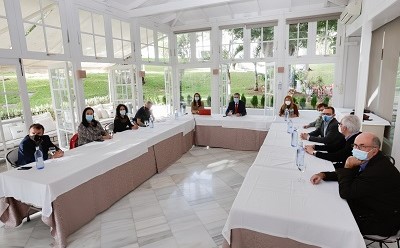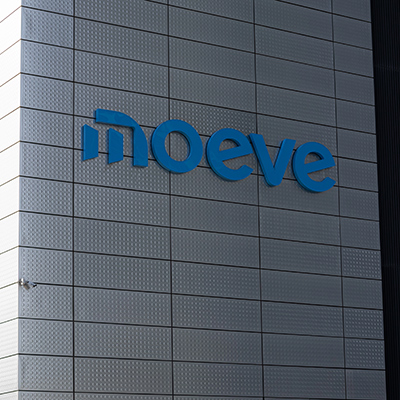- At the first meeting of the year, Cepsa's latest actions in redesigning its organization and the annual balance of its Fundación in the Canary Islands were also presented
The director of Cepsa in the Canary Islands, José Manuel Fernández-Sabugo, highlighted the organizational redesign that the energy company has been undertaking, which culminated at the beginning of the year with a renewed management committee, with Maarten Wetselaar at the head of the company as the new CEO.
He also recalled the agreements that are being carried out in the field of energy transition in which all the Parties are fully aware of the challenge that must be addressed to transform the current energy consumption model towards a new decarbonized model based on renewable energies and energy efficiency in line with the ambitious objectives for the 2030 timeline established by the European Union.
Along these lines, Cepsa has signed an agreement with Endesa to accelerate the decarbonization of transport and the promotion of sustainable mobility by developing what will be the largest ultra-fast electric recharging network on the road in Spain and Portugal, with facilities that will enable 80% of the battery of electric vehicles to be restored in around 10 minutes.
Another action was to sign a partnership agreement with Iberia to advance towards the decarbonization of the airline industry, through the development of and research into sustainable fuels and other alternative energies such as renewable hydrogen and electricity, to promote sustainable mobility for aircraft and the fleet of vehicles that serve them at airports.
In addition to this, we have partnered with the integrated energy infrastructure company Redexis to create Europe's first global network of service stations generating renewable energy. This will result in the installation of photovoltaic panels throughout Cepsa's network of service stations in Spain and Portugal, a total of 1,800, a process that has already begun and will be completed in 2023. This measure will prevent the emission of 11,500 tons of CO2 per year, which is equivalent to planting 6,000 trees.
Gradual dismantling of the Refinery
At the meeting of the Cepsa-Santa Cruz Liaison Committee, emphasis was placed on the recent visit to the Canary Islands of the company's new CEO, Maarten Wetselaar, in what was his first official visit after taking office in January. An aspect that makes clear the importance that the Canary Islands have for Cepsa, as the location where it was created, in 1929, for the construction of the Tenerife Refinery, the first in Spain and the only one for more than 20 years.
During his stay in the islands, Maarten Wetselaar held meetings with the Mayor of Santa Cruz de Tenerife, José Manuel Bermúdez, and the President of the Canary Islands Government, Ángel Víctor Torres, with whom he discussed the authorization recently obtained by the regional Ministry of Ecological Transition, Fight against Climate Change and Territorial Planning for the gradual dismantling of the units of the Tenerife Refinery, the first phase of which will last until 2025 and will guarantee the energy supply to the islands. The new CEO also made a visit to the refinery where he met with the staff.
Those attending the Liaison Committee highlighted the importance that the activity of the Tenerife Refinery has had on the economic and social development of the city and showed great interest in the process of gradual de-installation of the Refinery units and the environmental actions of soil remediation associated with this action.
The main environmental actions undertaken by Cepsa during the past year, as well as those that are being carried out at the moment, were other aspects discussed at the meeting. In this case, reference was made to the voluntary soil recovery plans that Cepsa is carrying out in several locations, such as the Bufadero Wharf, Castillo Negro-Parque Marítimo, and at the Refinery itself.
Fundación Cepsa Results Balance
The balance of the actions of Fundación Cepsa in the Canary Islands for 2021 was another of the points addressed at the meeting. The head of the organization in the Islands, Belén Machado, provided a detailed review of the projects developed in the social, environmental, and scientific-educational fields, which benefited nearly 19,000 people directly and more than 56,000 indirectly.
She also recalled some of the main milestones, such as the Social Value Awards, which went to seven social entities, the agreement with the IMAS for direct aid to eight entities of the capital of Tenerife, starting actions to rehabilitate the Parque de Las Mesas, the activities of the Fundación Cepsa Chair of Ecological Transition and Innovation of the ULL or the collaboration with the projects Chicas con Cienci@ULL and Inspiring Girls, to promote STEM careers among young women.
Finally, the Cepsa-Santa Cruz Liaison Committee made progress in scheduling the third meeting of the Dialogues in Action forum, scheduled for next March, choosing 'Change management in organizations' as the theme.
The Liaison Committee, created five years ago, is part of Cepsa’s information transparency policy and continues to be a regular meeting point to listen and respond to the concerns of Tenerife’s society.
Formed by representatives of various public and private entities, social, cultural, environmental, business, educational and neighborhood agents of Santa Cruz de Tenerife, together with Cepsa professionals, it represents a discussion body for the implementation of actions that will benefit the city and its inhabitants.



